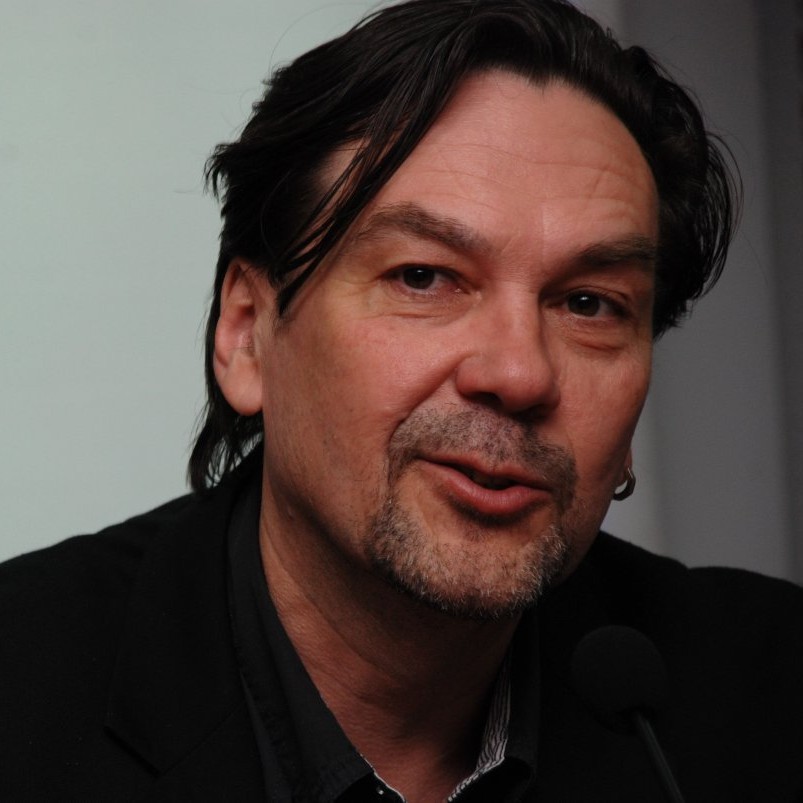Perverzion is ostensibly a documentary of the last days of Ukrainian poet Stanislav ‘Stakh’ Perfetsky in March 1993, when he was an apparent suicide in Venice. He travelled there to participate in an international seminar on: “The Post-Carnival Absurdity of the World: What is on the Horizon ?” and the bulk of the book chronicles his stay there, as well as the goings-on at the seminar.
A Foreword and an Afterword by the ‘publisher’ (the guise Andrukhovych assumes in this work) frames the text, providing some perspective. The Foreword introduces the central character, the pivotal event of 11 March, and offers some explanation of the material assembled here to document what (might have) happened. The Afterword is less summing up (admitting; “considerably more of the unexplained and unclear remains than one would expect”) than conclusion — a specific conclusion suggesting that, in fact, there was no suicide.
Much of the book does feel more like an episode in a life, rather than it’s summation; the alternative ending — that Stakh walked away — an appropriate mysterious-dramatic exit (as opposed to the overly melodramatic finale of actual suicide).
Perfetsky, the “Ukrainian poet and culturologist”, is at the centre of the book, the material, presented in thirty-one chapters, largely focussed on him — but there are a variety of approaches and perspectives. Perfetsky’s own accounts make up a significant part of the narrative, but there are also other accounts: reports to a ‘Monsignore’ by those who keep an eye on Perfetsky, letters, interviews, lectures, a summary of an opera buffa, a retelling of a video-recording, a will, and the transcript of a tape recording (without the expected tell-tale splash at the end).
Perfetsky comes from — where else ? — Chortopil (literally: ‘Devilopolis’ or ‘Demonopolis’, Naydan suggests in his notes), Andrukhovych’s favoured Ukrainian town. The book is set in 1993, the collapse of communism still relatively new, the exchange between East and West still undergoing transformations. Perfetsky is invited to the Venetian seminar (as a representative of the C.I.S.) by the foundation La morte di Venezia, and his trip there is one into a new world (which he doesn’t exactly ease into — despite (or because of) indulging in, among other things, considerable alcoholic excess). His handlers are the young Ada Zitrone and her husband, Dr. Riesenbock, whereby Ada in particular gets very close to him — while also reporting on him, as in some Cold War spy movie. (It should come as no surprise that Ada, too, can trace her roots back to Chortopil …..)
The seminar makes an enjoyable backdrop, the post-carnival absurdity of the world very much on display here. (Among the most amusing bits in the novel is the schedule that Perfetsky and the other participants are sent, describing what they can expect.) Andrukhovych indulges in a great deal of playfulness, having as much fun in devising narrative strategies and approaches to presenting the story (dividing the narrative into two columns on the page, to describe one event from two perspectives ! have Ada go through Perfetsky’s belongings and describe these various odds and ends ! etc., etc.) as in allowing a story to unfold. But he doesn’t really mean it to unfold: it’s meant to tie itself up in knots as much as it is to reveal itself. Much of this is good fun, and much is very clever, but it’s a specific kind of literary pleasure that probably won’t appeal to all. Still, especially in how he mixes it all up, shifting tone and approach from chapter to chapter (while also allowing certain approaches — Perfetsky’s own account, the reports to the Monsignore — to crop up regularly) he manages to sustain the reader’s interest (though occasionally almost only to see: what can he pull of next ?).
Perfetsky has his own ambitions and agenda
Thus will I indulge in this city. I will try to experience the hottest, the sharpest in it. I will find the most mysterious spot in it where they can’t reach me. Not the carabinieri, not the police, not the devil himself.
But, aside from the fact that others also have agendas (that often specifically centre around him), he’s easily sidetracked — “But today it’s still early” is just one excuse.
The novel builds towards Perfetsky’s lecture, but it’s not his last word, the novel continuing to its final act — or, possibly, non-act — Perfetsky writing his will and then making a final tape-recording.
Love figures prominently in the novel, a particular romantic notion: “Only love can save us from death. There where love ends, the ‘absurdity of the world’ begins”, he says in his lecture. There is his odd relationship with Ada, and he eventually tells her about his great love, his now dead wife. Perfetsky is also an Orpheus figure (and, of course, the opera buffa in the novel is called Orpheus in Venice), with that same air of fatality about him.
Perverzion offers easy satisfactions in many of its details, clever and funny set pieces and scenes, but on the whole it’s a more demanding cross-cultural text. Endnotes (both the author’s own, and additional ones by the translator) explain some of the oddities, but it’s also text that strains for strangeness, not wanting to be entirely approachable. It comes with considerable frustrations, but it can be well worth the effort.
Джерело: http://www.complete-review.com/reviews/postsu/andruky3.htm
